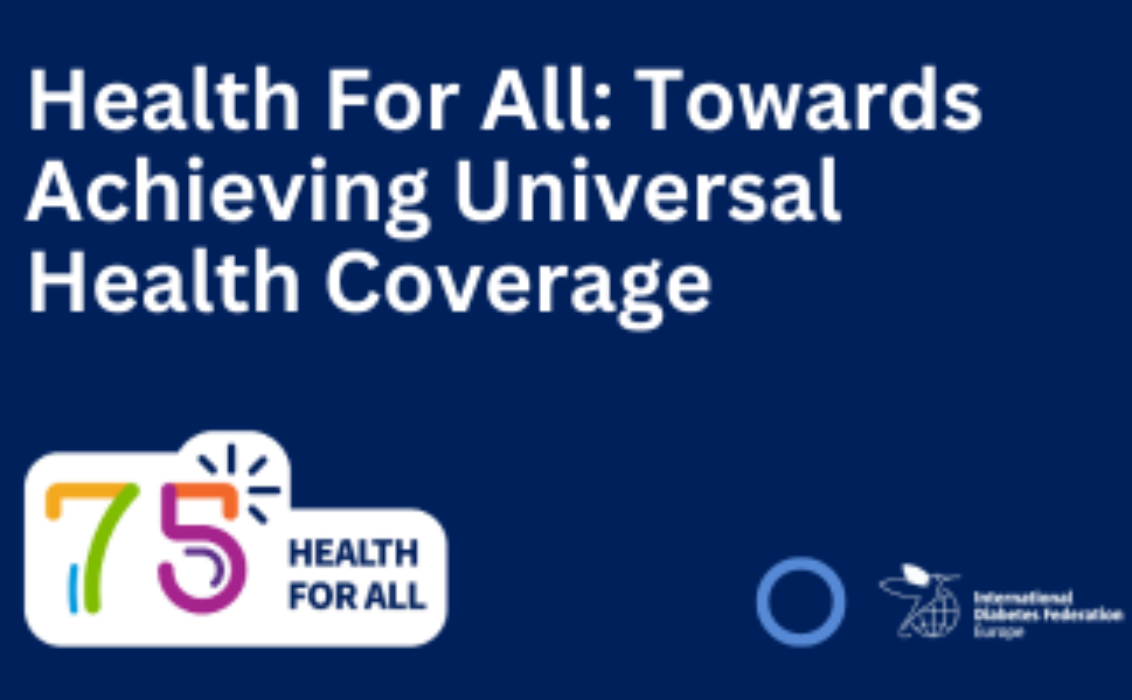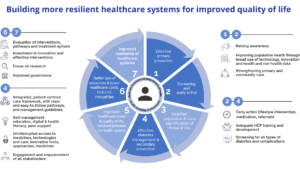On April 7, the world celebrates World Health Day (WHD). This year’s theme is “Health for All,” [i] emphasising the importance of equitable access to healthcare for all individuals, irrespective of their socio-economic status, geographical location or gender. This day is also the opportunity to celebrate the World Health Organization (WHO)’s 75th anniversary and highlight the progress that has been made to date and the work that still lies ahead of us in transforming healthcare systems to provide affordable, quality healthcare to all, and to move away from simply treating diseases towards preventing them.
Preventing non-communicable diseases (NCDs) such as diabetes and, when people live with these conditions, ensuring that they are adequately managed through the provision of the right care (including screening) at the right time is critical to achieving better health outcomes and quality of life and building more resilient health systems. Effective diabetes prevention and management keeps users away from the healthcare system, lowers costs, improves resource utilisation and contributes to health systems’ digitalisation, thereby shoring up the resilience of national healthcare systems. It also improves citizens’ quality of life and reduces inequalities. It benefits not just people living with diabetes (PwD) and those at risk of diabetes but also all people living with, or at risk of other NCDs and conditions.
Diabetes prevention involves addressing the root causes of the disease, reducing risk factors through policies that both promote healthy behaviours and environments and tackle the socio-economic determinants of health. Diabetes is a hugely complex condition, and its management requires not only uninterrupted access to care but also to essential medicines, tools and technologies [ii]. It also necessitates adequate knowledge and education for people living with the condition as well as healthcare professionals.
Implementing Universal Health Coverage (UHC) can be an important tool in supporting better prevention and improved management of chronic diseases such as diabetes. Access to essential care, diabetes medicines (e.g., insulin) and regular tests (e.g., for diabetes retinopathy and blood glucose monitoring) is a prerequisite to good diabetes management. Most of the times, these medicines and services are expensive, while without access to them, PwD are at risk of developing life-altering complications.
UHC means ensuring that everyone has access to high-quality health services without financial hardship. This includes all essential health services from health promotion to palliative care across the lifespan, delivered by well-trained health and care workers with access to quality-assured products. Achieving UHC is one of the targets set by the United Nations’ 2030 Sustainable Development Goals, and the World Health Organization aims to have one billion more people benefit from UHC by 2025. [iii]
Whereas in Europe the majority of the population is covered under statutory health systems for a broad range of services, some population groups still fall outside the safety net they offer, while in some countries, the gaps in coverage are significant. Some countries also have issues with the funding, design, and functioning of their systems, which can result in unmet healthcare needs, even for those who are covered by the healthcare system. Such unmet needs may arise due to cost, waiting times, and travelling distance, as detailed in the European Commission ‘Inequalities in access to healthcare’, report. Action is needed to reduce these gaps and inequalities within and across countries.
As documented in IDF Europe’s Delivering Value through Innovation in Diabetes Care Delivery, strengthening primary care is a fundamental component of better healthcare delivery. It has been shown to be the most effective and cost-effective way of bringing health services and well-being closer to people. Primary care is also where the vast majority of people living with type 2 diabetes are managed, and where identification of people at risk of developing diabetes and other chronic diseases can best be conducted.
Bearing these in mind, achieving “health for all” requires the implementation of Universal Health Coverage, supported by a re-organisation of healthcare systems, with a focus on quality primary and integrated care, underpinned by comprehensive education of healthcare professionals and PwD. Only through this, can we reduce the burden of disease and ensure healthy lives for everyone, everywhere.
On World Health Day, we call on all governments and decision-makers to invest in prevention strategies and provide uninterrupted access to the appropriate treatments, tools and technologies to reduce the risk for PwD of developing complications and be able to lead long, healthy and fulfilling lives.




